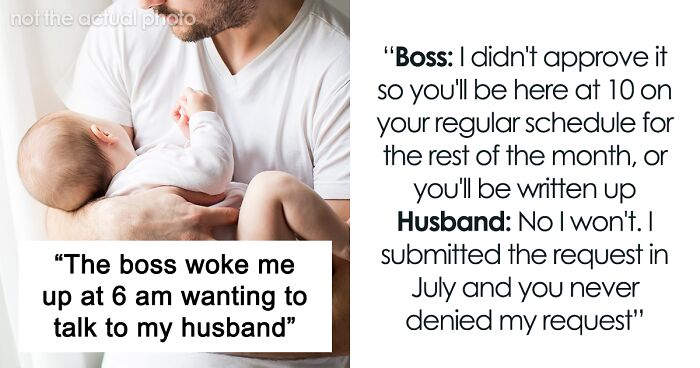
New Dad Can’t Get His 22-Year-Old Boss To Approve His Paternity Leave, Comes Up With A Genius Malicious Compliance Plan
Welcoming a baby into the world is an exciting milestone for the entire family. The next step is to establish a new routine in order to give the newcomer everything they need and be there for those must-see first baby moments.
But when Reddit user GraveyardPixy‘s husband asked his boss for paternity leave, his request was denied. Not only that, the 22-year-old manager appeared to really not care what was going on in his subordinate’s life. So, together with his colleagues, the man came up with a plan for malicious compliance.
This new dad couldn’t get his boss to approve his personal time off and paternity leave requests
Image source: seventyfourimages (not the actual photo)
So he came up with a brilliant plan to be there for his family and get back at the 22-year-old at the same time
Image source: Rawpixel (not the actual photo)
Image source: BGStock72 (not the actual photo)
Image source: Ron Lach (not the actual photo)
Image source: graveyardpixy
This story illustrates the broader picture, as new dads are still reluctant to go on paternity leave
Image source: thichas (not the actual photo)
A few years ago, when the research team at the University of Edinburgh analyzed data from Growing up in Scotland, a longitudinal survey designed to generate population estimates by tracking the lives of thousands of young children, they also conducted in-depth interviews with fathers of young children and an audit of the benefits employers offer.
“We wanted to better understand what prevents fathers from succeeding as working parents and how companies might help them overcome the challenges,” the co-author of the study, Alison Koslowski, wrote.
“Many of the fathers in our study wanted to actively parent their children, but they felt that they were able to do so only when their colleagues supported their choices,” Koslowski said. “The reality in many organizations is that expectations for female and male employees are still vastly different. While many organizations have programs to support young mothers — offering them mentoring, back-to-work schemes, and maternity replacement cover — this support intent is typically not available to new fathers. As such, fathers are worried about what it might mean for their career prospects if they go against what is normal in their workplace.”
Fathers worry about the family budget
The researchers also heard from many fathers that they are worried that taking paternity leave would be a significant financial burden.
“We found that in the absence of well-paid family leave, fathers would instead take paid vacation time, therefore taking much less leave to spend time with their children than they would be legally entitled to,” Koslowski said. “Fathers with higher incomes were both less concerned and more likely to take leave, but fathers with lower incomes had very real worries about how their family would survive if they took unpaid, or low-paid, time off.”
Interestingly, fathers who felt that their employers supported them as parents — with flexible work schedules, financial and social support during family leave, and other allowances — were more likely to be engaged with their jobs and to stay in them longer than they may have otherwise.
“Mirroring research in the U.S., the fathers we interviewed said that these parenting perks provided a stronger incentive to stay with the company than increased salary did. These positive benefits are lost, though, when fathers don’t take the leave that their employers offer.”
It’s in the best interest of the employer to allow their workers to take paid parental leave
Image source: tan4ikk (not the actual photo)
According to Koslowski, workplace culture has to be such that fathers feel that they can use their benefits without harming their career prospects. A number of internal policies can help with this, including making sure fathers have adequate coverage of their job responsibilities, as companies routinely provide to new mothers on maternity leave, and insuring that individual line managers support a father’s efforts to combine work and family life.
“Fathers need time to attend antenatal appointments, time off for dependents in the case of emergency or sickness, and the right to request flexible working,” the researcher explained. “These don’t have to be strict policies. Finding out who is on the school run, and arranging meetings and events accordingly, is a simple step that can reap benefits for all.”
Employers who, just like the one in the post, aren’t offering paid family leave may be choosing not to do so because they worry that it could be too expensive. But research suggests that costs may balance out because of the boost in staff engagement and retention.
The good news is that employers should experience a double benefit from supporting fathers in the workplace: in addition to attracting and retaining talented fathers, they also create opportunities for mothers. As working fatherhood becomes normalized, women are less often penalized for the ways they seek flexible work arrangements to handle childbirth and child care. Because of this, firms that support working parents should see their gender pay gaps lessen as well.
As people reacted to the story, the original poster (OP) shared more details
And many couldn’t believe that we’re still having issues like this in the 21st century
One of the stories my dad likes to tell is how, when toddler-me was sick my parents would switch daily in who would take time off work to care for me, and apparently my father's then boss wasn't very thrilled. He probably thought he was quite clever (and tooooootally not sexist) when he told my father something along the line of "he could understand the sentiment, but it should be understood that it is the job of the partner with the lower income to stay home to care for sick children." Well my dad still gets the biggest grin on his face every time he retells what he told his boss: That then he could be lucky that my dad bothered to show up at all.
I love your dad. I can just imagine the twinkle in his eyes when he tells this story.
Load More Replies...My son passed away several years ago, but he was on life support for a week prior. I worked at a medical office, and one of the docs was my PCP. When we found out my son wasn't going to make it, he gave me a prescription to help me calm down and deal with the situation. At that time, such prescriptions had to be picked up at the office as a hard copy and taken to a pharmacy. When my sister went to pick up the hard copy, our office manager asked her if she knew how long I was going to be out. Naturally, my sister flipped. A few days later, she told my mom that I had several weeks of PTO, but she didn't want me to know that because she didn't want me to be gone too long. My mother was so shocked and livid that she just walked away before exploding on her. I left that job a year later, but I made sure to let my boss know that I knew all about those things. She also denied my raise a few months after my loss because I would " get emotional" when patients would give condolences. This woman also took 2 weeks off and was "traumatized" because her nephew was injured in a biking accident. There were several other heated exchanges before I left. She didn't understand why I was upset that I worked 100 yards away from where I held my son as he passed or that our windows all faced that building. Yet she described herself as "soft-hearted" and always talked about church. Unbelievable!
Hate (ok not hate but extremely dislike) 'christians' like that who are so loud that they give the rest of us a bad name
Load More Replies...We really need to do away with this corporate "absent father" mentality. For one, it's not fair to for the rest of the family to have to put their lives on hold if the mom needs help, because the dad's job won't let him do it. But this also strikes single and non-straight fathers too.
One of the stories my dad likes to tell is how, when toddler-me was sick my parents would switch daily in who would take time off work to care for me, and apparently my father's then boss wasn't very thrilled. He probably thought he was quite clever (and tooooootally not sexist) when he told my father something along the line of "he could understand the sentiment, but it should be understood that it is the job of the partner with the lower income to stay home to care for sick children." Well my dad still gets the biggest grin on his face every time he retells what he told his boss: That then he could be lucky that my dad bothered to show up at all.
I love your dad. I can just imagine the twinkle in his eyes when he tells this story.
Load More Replies...My son passed away several years ago, but he was on life support for a week prior. I worked at a medical office, and one of the docs was my PCP. When we found out my son wasn't going to make it, he gave me a prescription to help me calm down and deal with the situation. At that time, such prescriptions had to be picked up at the office as a hard copy and taken to a pharmacy. When my sister went to pick up the hard copy, our office manager asked her if she knew how long I was going to be out. Naturally, my sister flipped. A few days later, she told my mom that I had several weeks of PTO, but she didn't want me to know that because she didn't want me to be gone too long. My mother was so shocked and livid that she just walked away before exploding on her. I left that job a year later, but I made sure to let my boss know that I knew all about those things. She also denied my raise a few months after my loss because I would " get emotional" when patients would give condolences. This woman also took 2 weeks off and was "traumatized" because her nephew was injured in a biking accident. There were several other heated exchanges before I left. She didn't understand why I was upset that I worked 100 yards away from where I held my son as he passed or that our windows all faced that building. Yet she described herself as "soft-hearted" and always talked about church. Unbelievable!
Hate (ok not hate but extremely dislike) 'christians' like that who are so loud that they give the rest of us a bad name
Load More Replies...We really need to do away with this corporate "absent father" mentality. For one, it's not fair to for the rest of the family to have to put their lives on hold if the mom needs help, because the dad's job won't let him do it. But this also strikes single and non-straight fathers too.

 Dark Mode
Dark Mode 

 No fees, cancel anytime
No fees, cancel anytime 




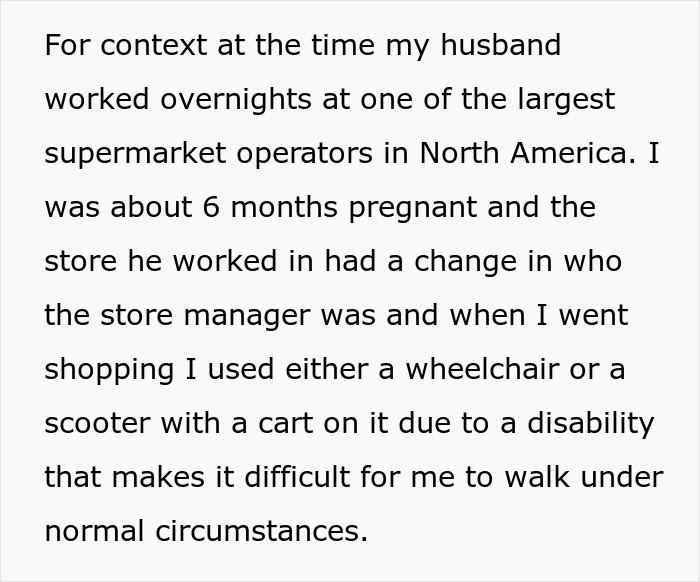

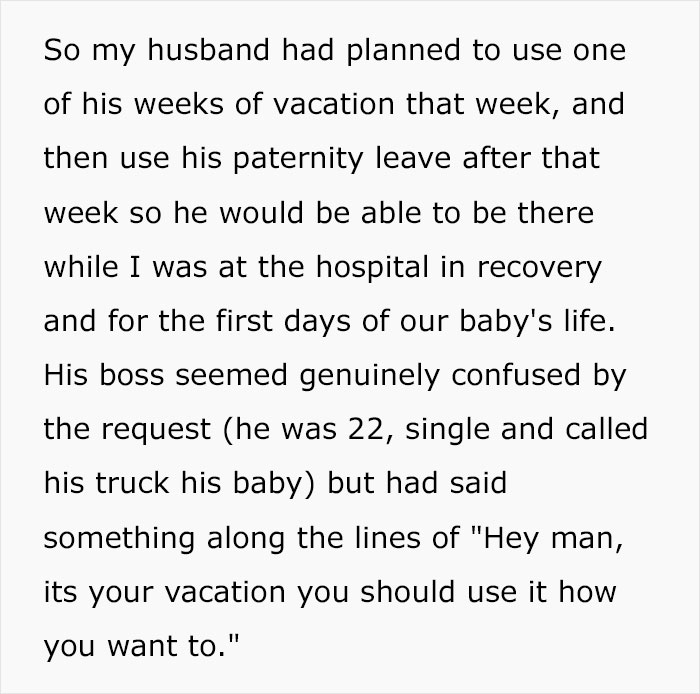
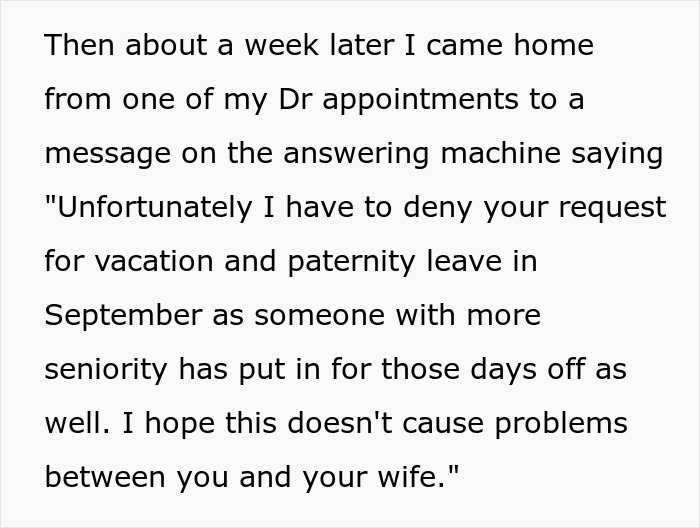
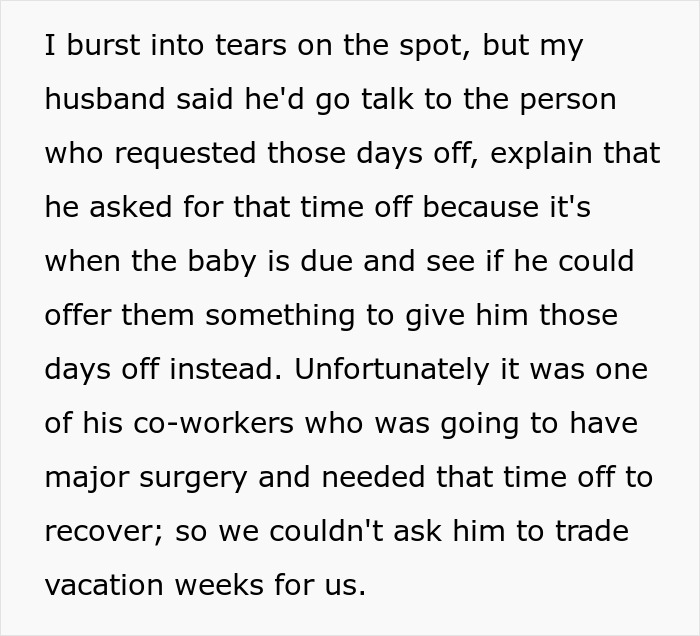
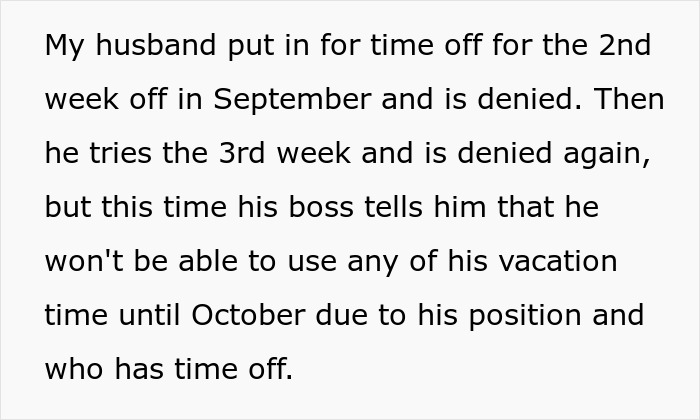
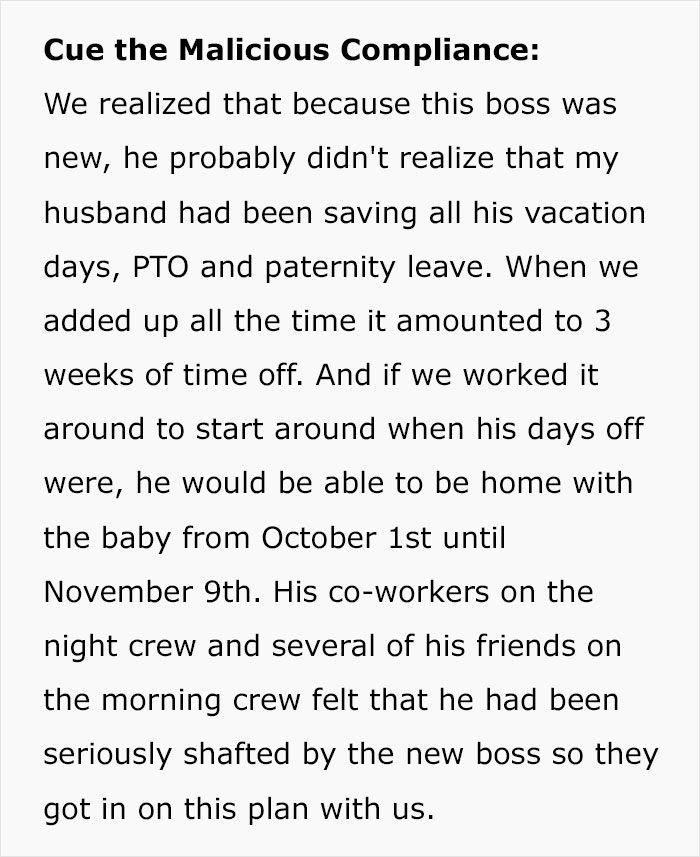
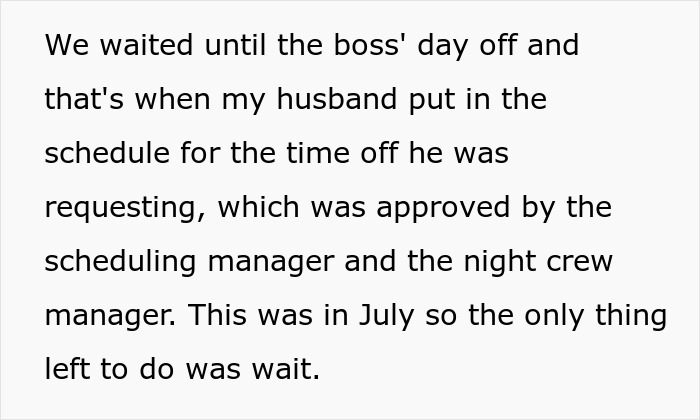
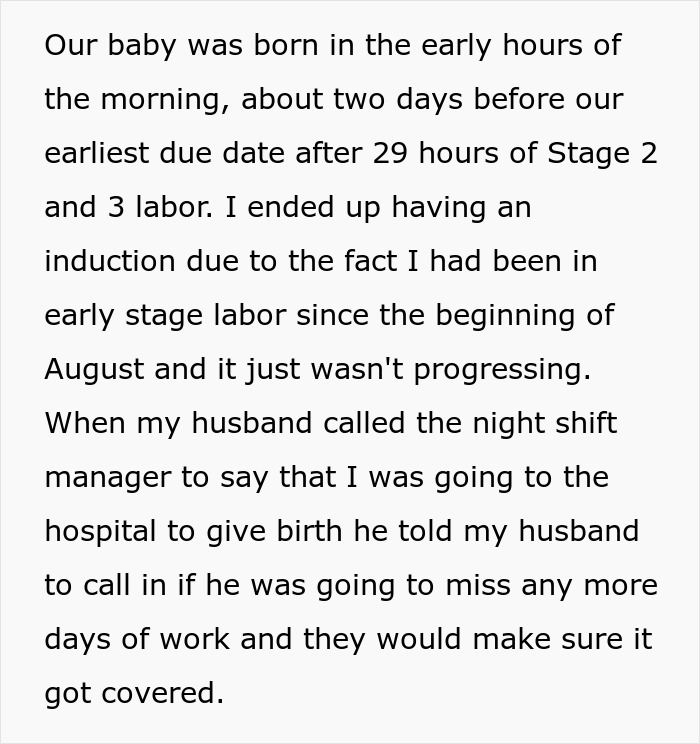
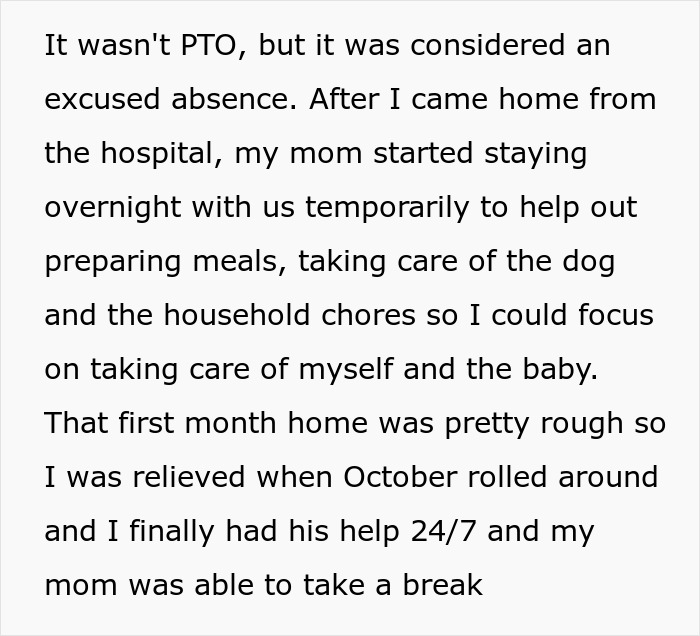

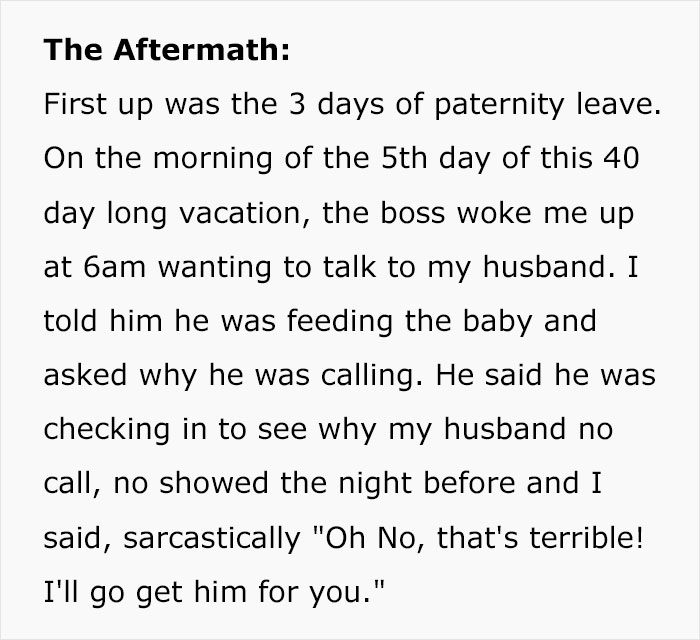
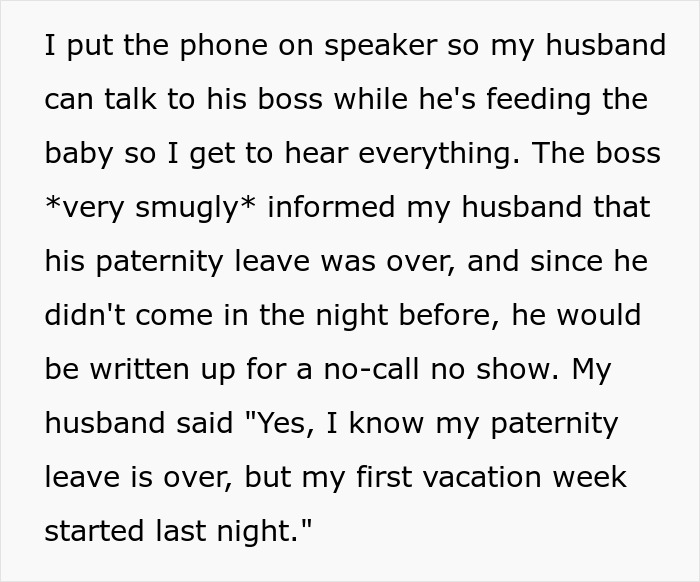
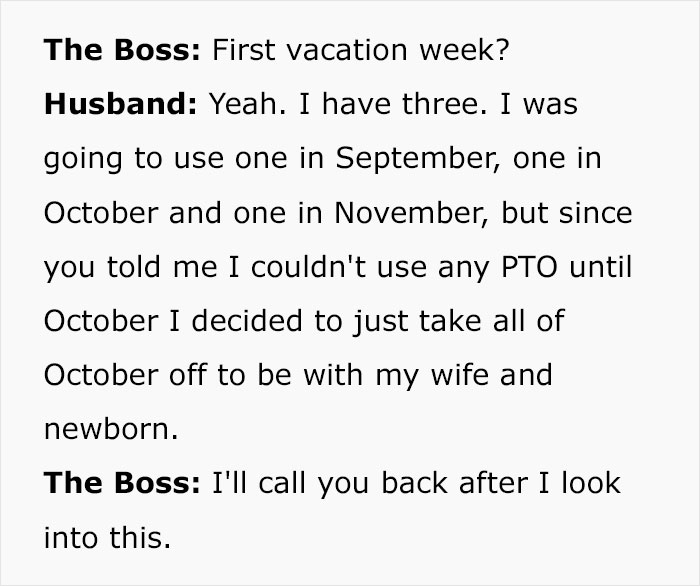

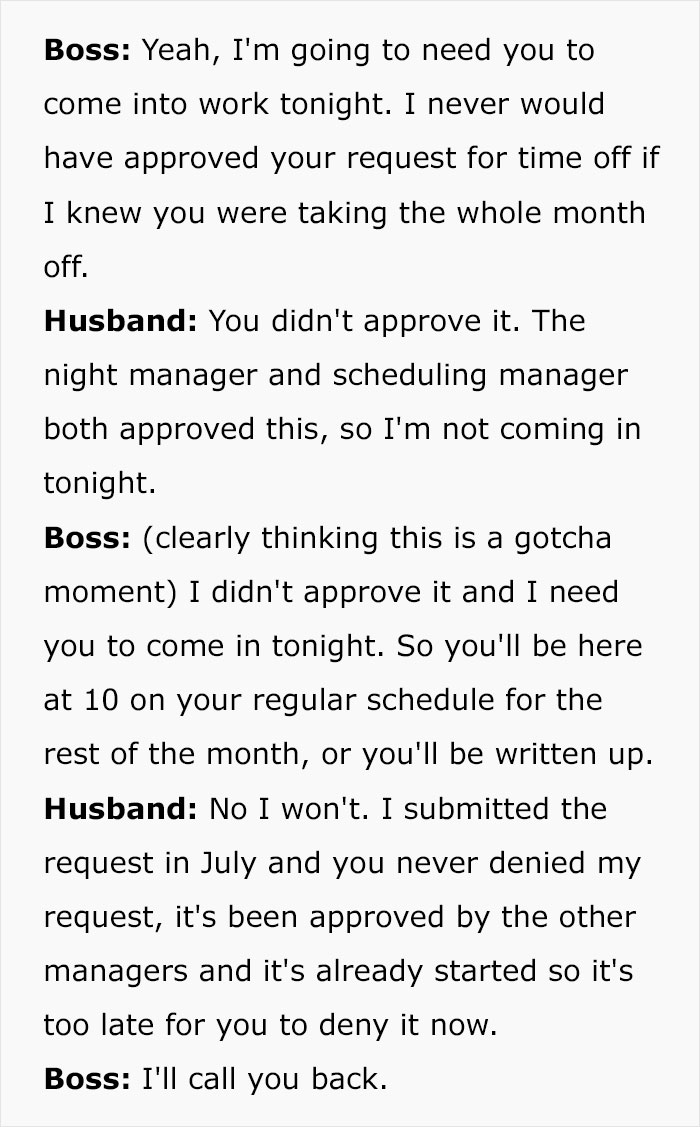

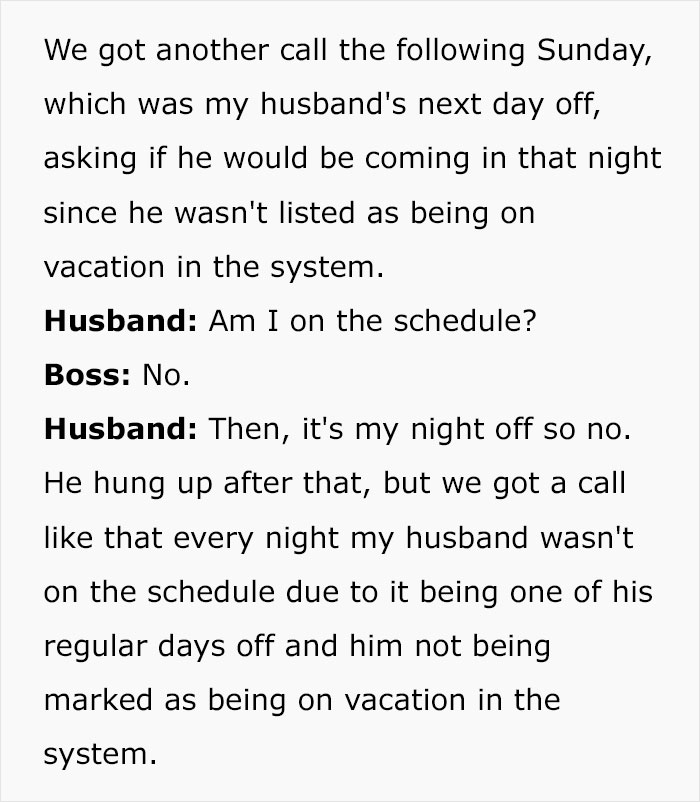

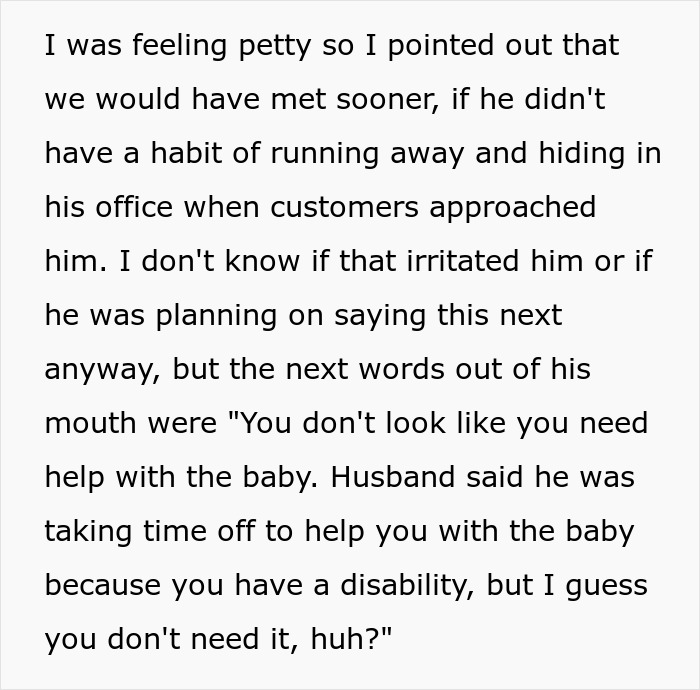

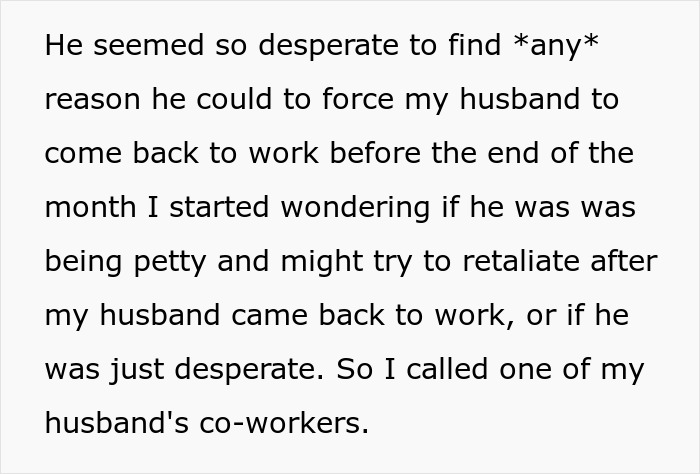

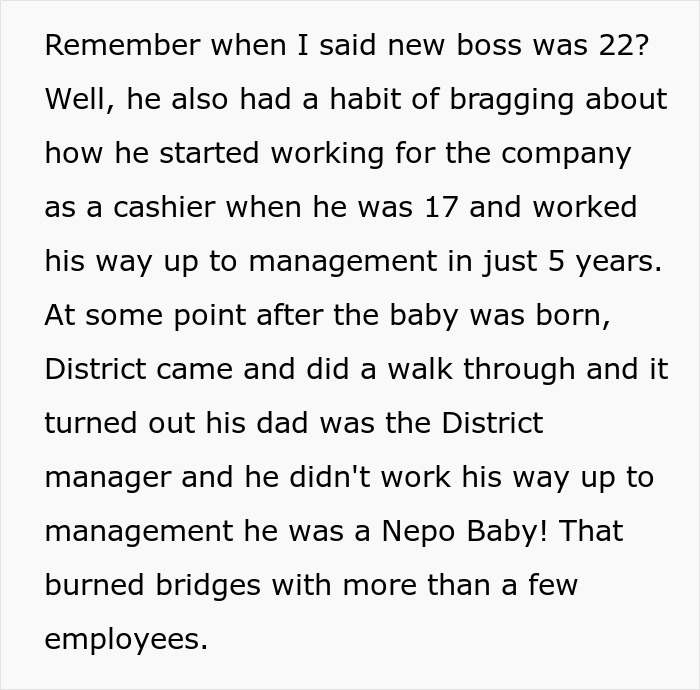

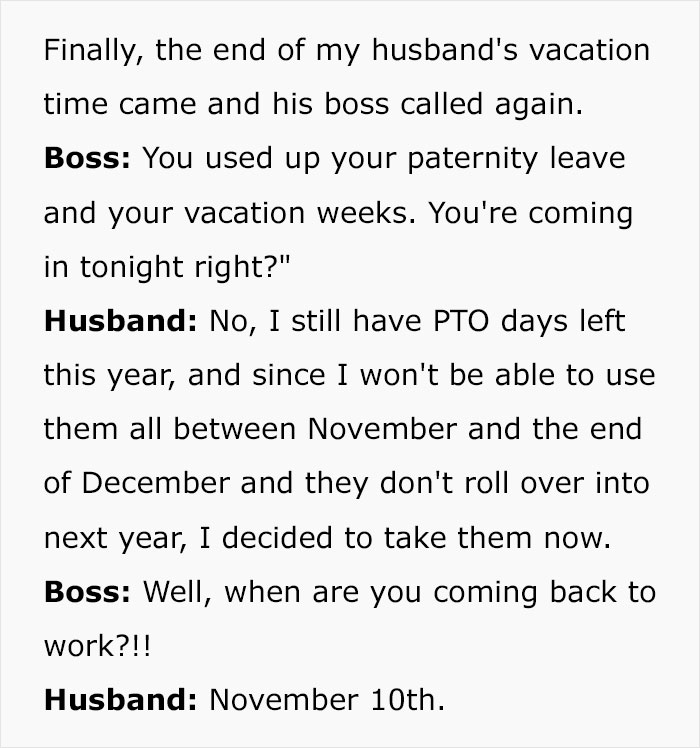
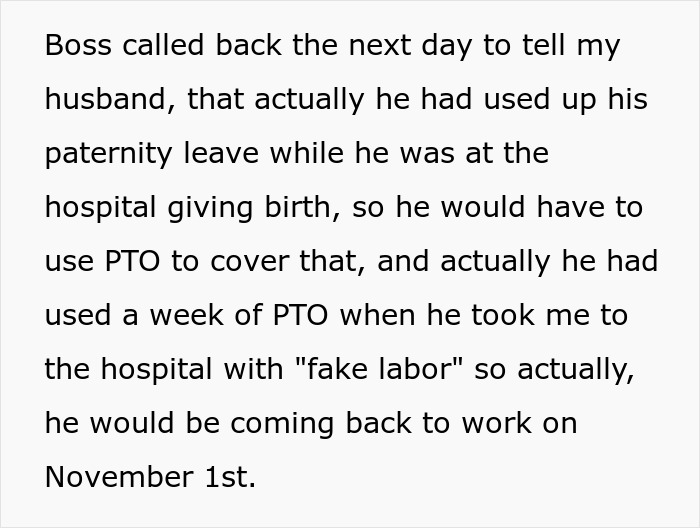

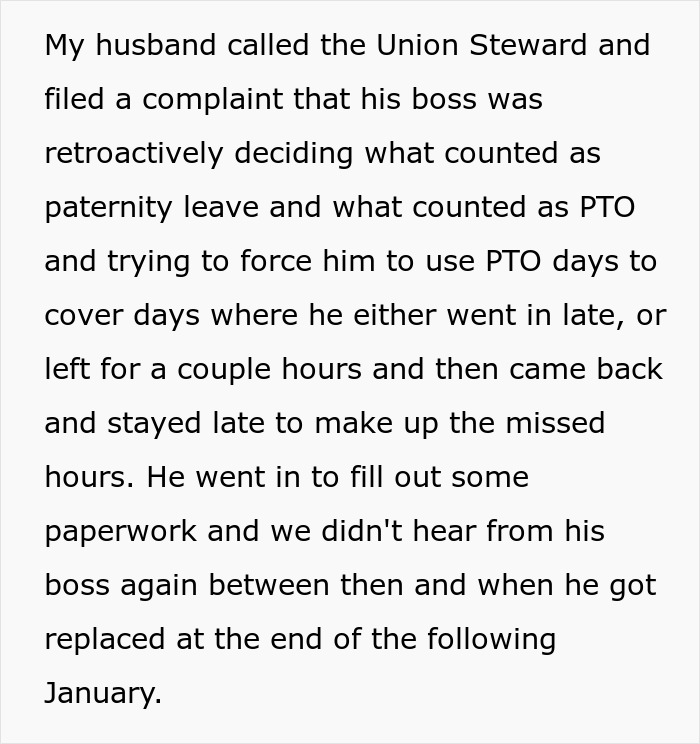
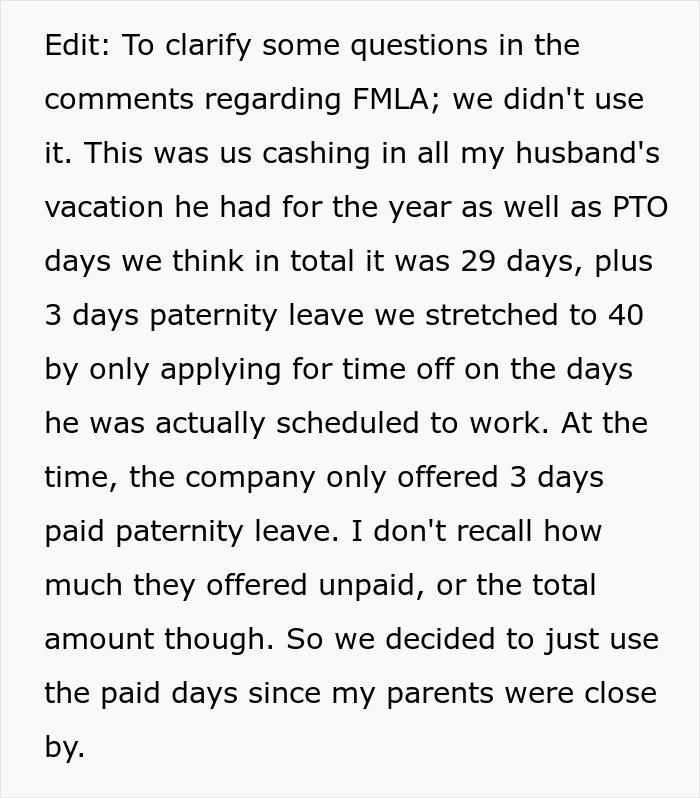
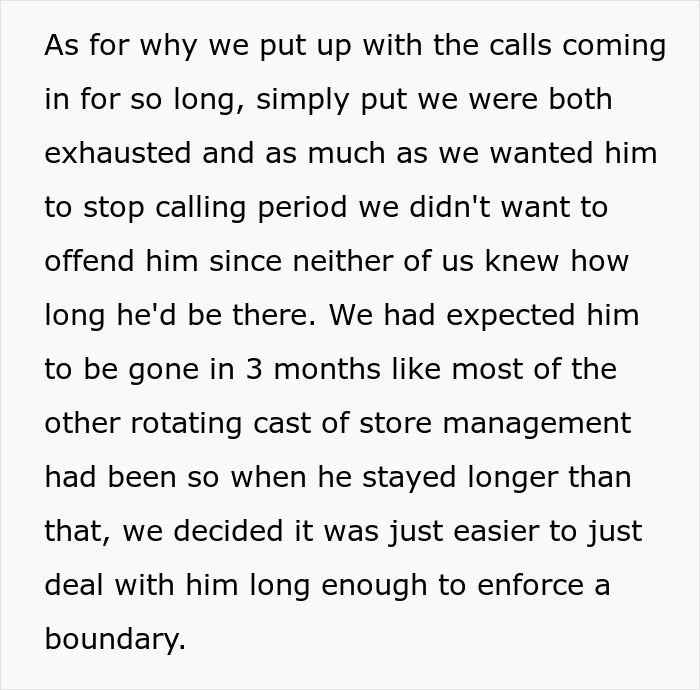


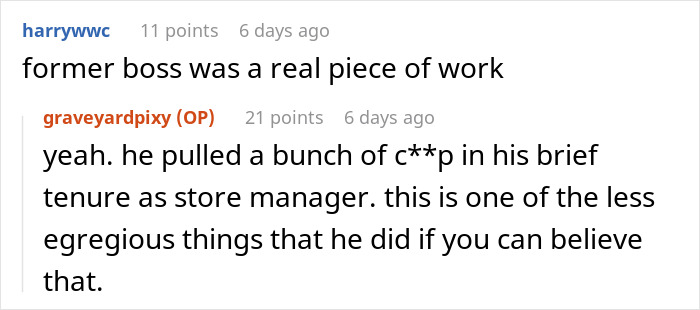
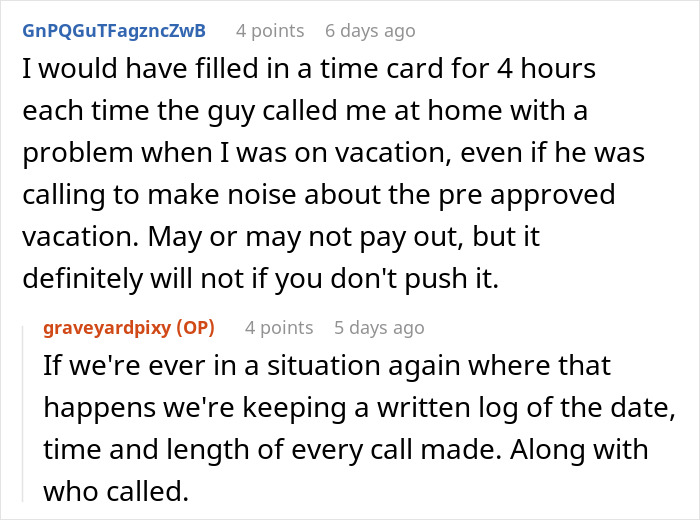


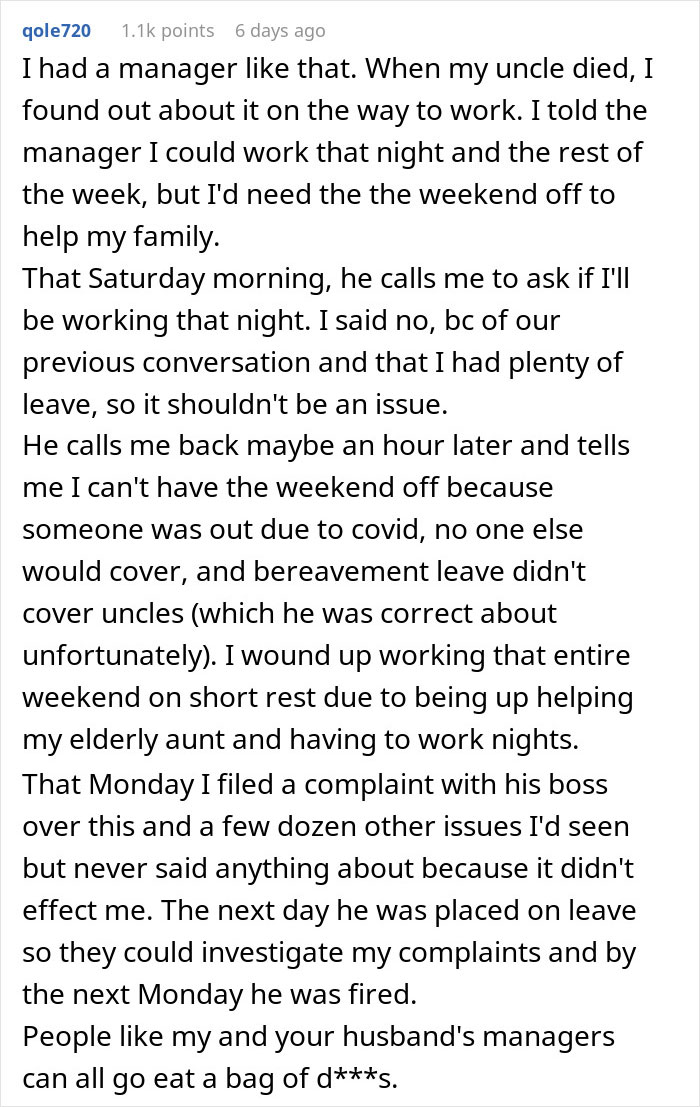

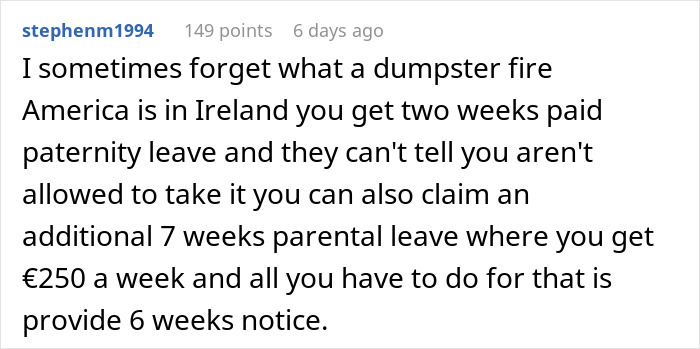

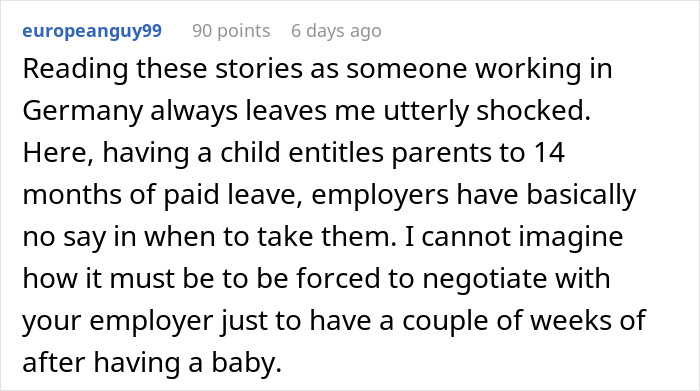
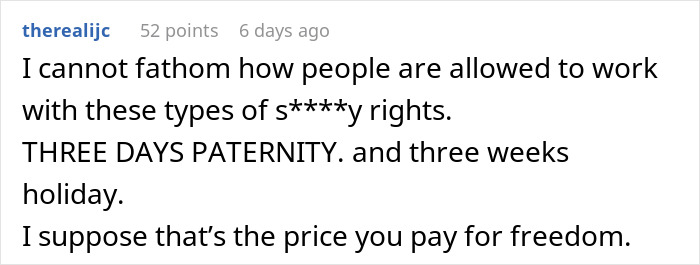
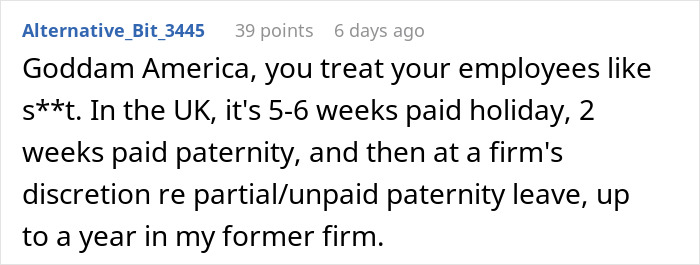














































84
49